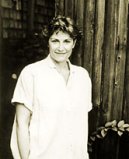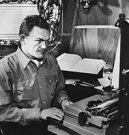 |

|
Keeping up with the Joneses:
An Interview with Kaylie Jones
January 14, 1999
by Dan Lybarger
Originally appeared in the January 14-20, 1999 issue of Pitch Weekly.
........................................................................................................The late James Jones and his daughter Kaylie
Jones have a unique similarity. Both are novelists, and both have films of their books
playing in theaters.
The elder Jones wrote tough, vivid stories that inspired this week's The
Thin Red Line and the memorable films From Here to Eternity and Some Came
Running. Speaking from New York City, Kaylie Jones, whose A Soldier's Daughter
Never Cries came out in cinematic form last fall, recalls that her father was bothered
by Hollywood's treatment of his books, even when the movies were good (From Here to
Eternity won eight Oscars, including Best Picture).
"When he was young, he said that he didn't like the films as
much," Jones says. "He thought that they were not true to the books. With From
Here to Eternity, they had to change many things at the time because of the
censorship. My God, (one of the characters) couldn't be a prostitute in the movie. There
was a lot of stuff like that they had to change, and it really upset him. And then years
later, he saw the film again and said 'That's a really good film. I was so attached to the
book that I couldn't separate them.'"
If From Here to Eternity was toned down for film, director
Andrew Marton's 1964 adaptation of The Thin Red Line, which starred Keir Dullea (2001:
A Space Odyssey) and Jack Warden, missed the point of its source entirely. The first
film, based loosely on James Jones' own experiences during the Battle of Guadalcanal in
World War II, faded into obscurity.
Jones says there is a reason for its low visibility. "My husband
and I just rented it. It's not a good film. (The movie) doesn't know what it is. It was
made in the early '60s. There was no such thing as an 'antiwar' film. It was trying to make a heroic
war film from a novel that says war is terrible. It was a low-budget movie that was filmed
in Spain, so it looks nothing like the terrain," she states. There was no such thing as an 'antiwar' film. It was trying to make a heroic
war film from a novel that says war is terrible. It was a low-budget movie that was filmed
in Spain, so it looks nothing like the terrain," she states.
Director Terrence Malick's (Badlands, Days
of Heaven) new $52 million version of the story is considerably more ambitious than
its predecessor. It boasts an all-star cast (Sean Penn, John Cusack, Nick Nolte, Woody
Harrelson and John Travolta) and a closer understanding of its author's intentions. Jones
explains, "It's not like anything else I've seen before. There's this cinéma
vérité style to Terry's work, which I find truly fascinating. He makes it almost like a
documentary on some level, like you're walking into the middle of this story, and you
don't know anybody's background and who they are. But you know they're all together and
they're going to fight for this hill. There's this other thing on top of it, this lyrical
imagery, this poetry. It's a very strange combination of the two things."
She adds, "It's not a movie that you walk away from thinking,
'Isn't it nice that those heroic soldiers died for a good cause.' You walk away with a
hole in your stomach that stays for days. In that sense, it's true to the book. There is
bravery and heroism, but the whole idea that it is for a great cause is not there at
all."
In fact, Malick's realistic approach necessitated an unusual similarity
with both adaptations of the novel. The character of Captain "Bugger" Stein, who
is Jewish in the novel (anti-Semitism in the military is one of the book's themes) is not
a Jew in either film. In the first movie, he is called "Stone." In the new film,
Elias Koteas (Crash) plays "Staros." Jones recalls, "They changed
him because the actor that Malick picked to play him is Greek. Elias, when he first got
the part, was playing him as Jewish, as Stein. Terry said, 'I don't want you to play a
part. I want you to be you. I want you to speak Greek and pray in Greek.' I talked to
Elias, and he said this was the most terrifying experience he had ever had as an actor
because he was being told to be himself, how would he handle this situation?"
James Jones attempted to be just as realistic when he was writing
screenplays, but filmmakers at the time weren't prepared for his approach. His daughter
laments, "He wrote all the Omaha Beach scenes in The Longest Day (a 1962 movie
about D-day). He was outraged and furious because they didn't want to show any bloodshed.
He would have been, I think, very happy with that first 25 minutes of Saving Private
Ryan. After that, I think he would have been very disappointed with the rest of the
film. I think it is the antithesis of what he believed war films should be about. His
notion of war films in general was that they were phony. The public wants to believe that
war is valor and that individual human sacrifice is not for naught. He believed the
opposite. I think that Saving Private Ryan is just the same thing as all those
other films."
Kaylie Jones' own experiences with the filming of her
semi-autobiographical novel A Soldier's Daughter Never Cries were much happier.
"It's a lovely film," she says. "A lot of critics were disappointed because
they wanted a 'Daddy Dearest' story, which is not what I intended to write. People always
like a gossip story, a bad story over a good one."
Jones is not ashamed of writing an affectionate tome, but she has had
some minor reservations about the film. "In the film, the father (Kris Kristofferson)
is almost too perfect. The angry, drinking side of him that's in the book isn't there. I
would have liked him a little more rounded. There were hints, but it wasn't
explicit," she explains.
Nonetheless, Jones, who was in constant communication with the
filmmakers, thinks the changes may have been necessary. Jones says, "In a lot of
cases, it's very smart to separate from your work. I didn't write the screenplay. I'm glad
Ruth Prawer Jhabvala and Jim (Ivory, the director) wrote it together. She's won two
Academy Awards. I don't think novelists should adapt our books into screenplays because
our vision of the work is in the novel. You can't translate that vision directly to the
screen. Somebody else can give it a rebirth, but it almost has to be killed first in order
to be given a rebirth."
With the release of the films and of her forthcoming novel, Faded
Midnight, the last year has been busy but rewarding for Jones. However, she says she
has some concern for her 13-month-old daughter. "She loves books," Jones says.
"She has about 20 or 30 books already. Her favorite thing is to bring books to me and
have me look at the pictures, read to her and turn the pages. My husband and I are saying,
'Oh no. Not another writer.' We want her to be a rocket scientist or an explorer or go to
Mars, anything but a writer."
Back to Home
|


